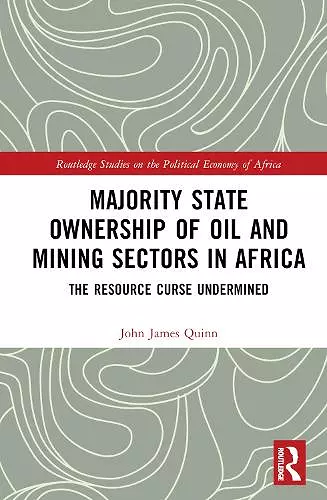Majority State Ownership of Oil and Mining Sectors in Africa
The Resource Curse Undermined
Format:Hardback
Publisher:Taylor & Francis Ltd
Published:30th Sep '24
Currently unavailable, and unfortunately no date known when it will be back

Majority State Ownership of Oil and Mining Sectors in Africa: The Resource Curse Undermined shows that countries in sub-Saharan Africa with majority state ownership of their major oil or mineral export sectors suffered from more severe versions of the natural resource curse than other similar countries.
Examining natural resource exporting nations in sub-Saharan Africa between 1966 to 2000, Quinn shows that on average, states with majority state ownership of these sectors featured lower growth, lower incomes, declining alternative export sectors, more debt, lower levels of investment, lower levels of political and civil rights, and more domestic conflict than other similar countries. These results remained fairly consistent across both cross-country data, as well as in paired case studies. One surprise finding is that these countries either had depreciating currencies, or did not feature high levels of currency appreciation, on average, which is inconsistent with resource curse literature predictions. Rather, most countries with majority state ownership had high levels of currency overvaluation – which operated in a similar manner as currency appreciation.
This work should appeal to students and faculty interested in the political economy of development, the natural resource curse, and African development, as well as politicians, policy makers, and NGO workers working in these areas. The strong recommendation of the book is that governments should control 50% or less of these sectors.
“Why so many countries that possess abundant natural resources experienced more negative economic outcomes is a phenomenon known as the “natural resource curse,” and it has resulted in a rich academic literature. Less often addressed is the variation in performance among these nations. John Quinn, in this invaluable book, provides a compelling answer: the extent of state ownership and management of these sectors. With meticulous documentation, Quinn shows that countries with majority ownership and control featured poorer economic outcomes than those will less state involvement. This cogent and accessibly written book is a must read for scholars, students, and practitioners of economic development.”
Michael Lofchie, Political Science, UCLA
“This volume offers an insightful treatment of the natural resource curse. Quinn’s investigation of oil and mineral exporting states in sub-Saharan Africa produces an important conclusion: majority state ownership is crucial in bringing on more harmful results. This policy-relevant volume is essential reading for anyone with interests in political economy or Africa.”
Patrick James, Dornsife Dean's Professor Emeritus, International Relations, USC, United States
“Quinn offers a compelling and readable book that deals with the overlooked variable of majority state ownership of natural resources in resource rich countries. Such ownership can lead to more severe forms of the resource curse, often characterized by low growth. High natural resources endowments need not condemn a country to the resource curse. A more limited government role in ownership, with sound policy and regulation, can better promote the national interest. Highly recommended!”
Emmanuel Nnadozie, Former Executive Secretary, African Capacity Building Foundation
“Using a Most Similar Systems Design and the lens of political economy, Quinn presents detailed case studies of African countries heavily engaged in oil or mining exporting to examine the “resource curse” controlling for the impact of majority state ownership, concluding that resource endowments present more of a “challenge” than a “curse.” Scholars and students from a variety of fields can flexibly use this intriguing book for its general theory and methodology, for its detailed case studies, or both.”
Terry Olson, Chair Economics, Truman State University
"Any student of African politics and political economy—like the reviewer—very much welcomes detailed analysis of the region, especially when results put negative, stereotypical findings into perspective and provide practical advice. Finally, the book demonstrates how to successfully apply a multi-method approach. While cross-sectional statistical analysis provides the big picture, more qualitative paired comparison digs deeper into the cases. [...] John Quinn’s book represents valuable scholarly work and is highly recommend for students and scholars who want to learn more about the political economy of natural resources and African politics alike."
Matthias Basedau, German Institute for Global and Area Studies, writing in Perspectives on Politics, Cambridge University Press.
ISBN: 9781138390331
Dimensions: unknown
Weight: 530g
186 pages